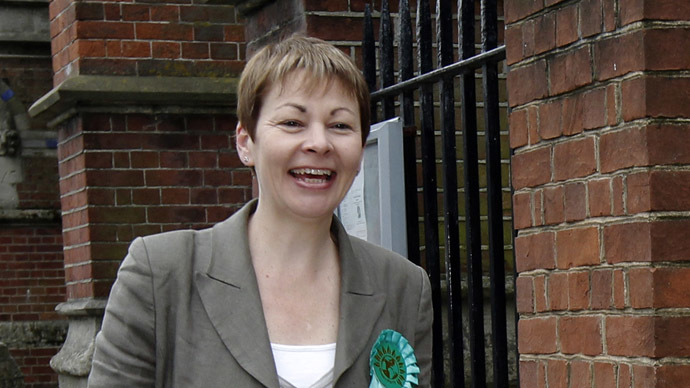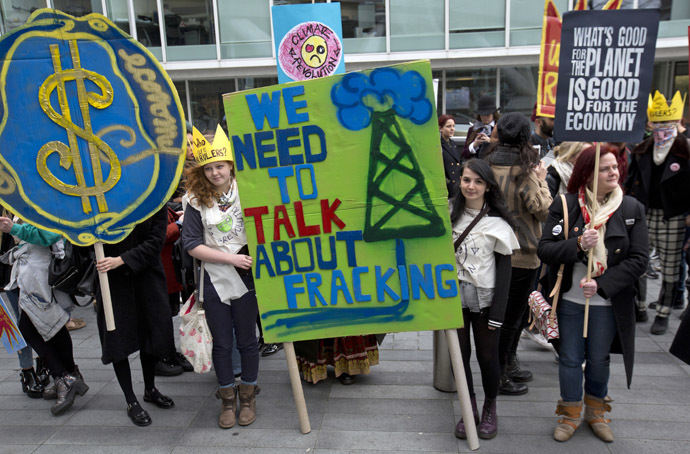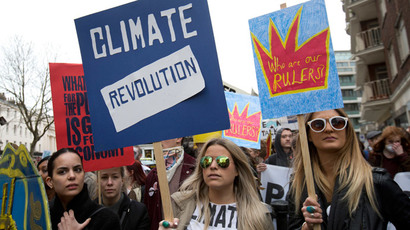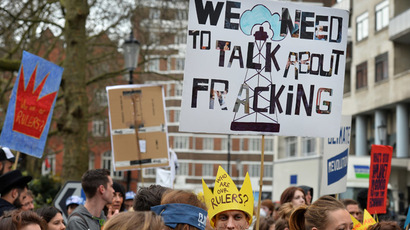An inconvenient truth? UK government censors state-sanctioned report on fracking

The British government’s decision to censor an official state report on the impact of fracking on UK property prices and regional services has roused sharp criticism from MPs and campaigners.
As the government maintains its refusal to offer compensation to homeowners situated near proposed shale gas drilling sites, concerned citizens and campaigners are demanding the release of the full, unabridged study.
Following a Freedom of Information (FOI) request tendered to the government, a draft of ‘Shale Gas: Rural Economy Impacts’ was recently published with extensive sections of the text missing. One particular section of the report, which examines the impact of fracking on house prices, has three entire segments missing.
The government report only referenced research considered ‘robust’, and noted difficulty in comparing UK locales with overseas districts. It also claimed that the confluence of factors, which drive housing prices upwards or downwards are complex and not easily disentangled.
Notably redacted portions of the study spanned its executive summary, a section on 'Hydrocarbon reserves', another on ‘investment and job creation’, a third documenting areas ‘likely to be affected by shale gas licensing’, a segment relating to fracking’s economic impacts on rural communities, and large segments relating to the ‘social impacts’ of shale gas drilling on rural locales.
The controversial report was released by the Department for Environment, Food and Rural Affairs (DEFRA) in the aftermath of the government’s decision to open up two-thirds of England’s landmass to a fresh round of bidding for fracking licenses.
‘Number of redactions comical’
Prime Minister David Cameron and Chancellor of the Exchequer George Osborne say shale gas extraction harbors the potential to enrich the UK’s economy and decrease energy bills. But many MPs contest this view, expressing deep concerns that fracking will reap environmental damage, disfigure the landscape, and decrease the value of home prices in their local constituencies.

Caroline Lucas, an MP and Green Party representative for Brighton Pavilion, condemned the censoring of the government’s report, warning it would compound public concern about the dangers of shale gas drilling.
"It appears that the government has a great deal to hide with regards to the risks of fracking for local communities," she said.
"The number of redactions would be almost comical if it weren't so concerning. What are the economic, social and environment impacts and effects upon housing and local services, agriculture and tourism that the government is so keen to withhold from us?”
Lucas cautioned that the public has a right to know the truth about fracking, and called for “absolute transparency” with respect to government research that examines its dangers.
In a move to offer compensation to people who may be affected by shale gas drilling in their locales, the government has suggested a meager sum of 100,000 pounds in “community benefits” be divided among those living near such sites. But Barbara Richardson, of the Roseacre Awareness Group that opposes fracking in Roseacre, Lancashire, said this offer was an “insult,” as certain homeowners in her district are currently unable to sell their properties.
“People do not want community benefits, they want restitution," Richardson emphasized.
Widespread calls for compensation
Labour MP for Worsely and Eccles South, Barbara Keeley, has joined the chorus of campaigners, politicians and UK citizens calling for compensation for those whose houses may depreciate in value as a result of fracking.
"I know that people living near to the Barton Moss IGas drilling site are very concerned about loss of value in their house prices due to the drilling. They are also concerned that house insurance premiums may increase substantially," she told the Guardian.
"One couple trying to sell their home told me that no one came to view the house at all since the drilling started. The government should consider the need for compensation for residents negatively affected by shale gas operations," she added.

On the question of why multiple and extensive portions of the report had been redacted and obscured from public knowledge, a government spokesperson claimed there is “no evidence that house prices have been affected in over half a century of oil and gas exploration in the UK or evidence that this would be the case with shale.”
“This government believes that shale has a positive part to play in our future energy mix, providing energy security, driving growth and creating jobs", the spokesperson added.
A DEFRA letter which accompanied the report defended the government’s decision to withhold elements of its findings. Emphasizing piecemeal transparency with respect to this research was in the “public interest,” DEFRA claimed state officials had to carefully “consider implications of potential impacts” relating to the “development of the shale gas industry.”
The withholding of such information would allow for the developing of options with respect to fracking, and essentially mitigate “the risk that disclosure of early thinking could close down discussion” on this form of energy extraction, DEFRA argued.
Concerns regarding the government’s strategic suppression of vital information relating to this report are followed by the release of a recent poll, which claims 57 percent of UK citizens are in favor of fracking. But Greenpeace emphasizes that the research, financed by energy firm UK Onshore Oil and Gas, lacks independence and is a skewered portrayal of British public opinion on the issue.














